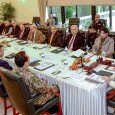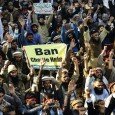By Zia Bangash –
The curse of changing loyalties has survived because there is just no will to implement the anti-defection law
Last year, former foreign minister Shah Mahmood Qureshi ended his decade-old loyalty with the ruling Pakistan People’s Party to join Imran Khan’s ‘promising’ Pakistan Tehrik-i-Insaf. Irrespective of what political benefits Qureshi might have been expecting from joining the PTI, he had to pay a huge price for switching sides. The loss to him looks irreparable, at least for now.
Shah had to vacate his parliament seat won in 2008 general elections from his home constituency in Multan district of South Punjab or cotton-rich Seraiki belt — a region where Qureshi had both political clout and rivalries. His constituency — apparently the only tangible political asset — fell to ousted prime minister Yousaf Raza Gilani’s son in the subsequent by-elections because Imran Khan decided not to field his party and Qureshi was forced to obey. He is worried since then, family sources said, unsure whether he would ever be able to win back the seat lost to one of his most potent rivals.
“Irrespective of what political benefits Qureshi might have been expecting from joining the PTI, he had to pay a huge price for switching sides. The loss to him looks irreparable, at least for now”
It was unavoidable for Qureshi to vacate the seat after defecting from the party that supported his candidature the last time. Otherwise, he would have been thrown out disgracefully by the PPP through a constitutional provision seeking to control what is called floor crossing — one of the stigmatic hallmarks of Pakistan’s convoluted politics over the decades. The relevant clause of the constitution seeks disqualification of parliamentarians if they switch loyalties to betray the party on whose ticket they won elections. But Qureshi might have not had to go through the pains of losing so much, had he been among a 20-strong group of PPP defectors who quit the party to help the-then military ruler General Pervez Musharraf form a government of his choice.
These men won the 2002 general polls as PPP candidates but formed a dissenting forward bloc within the party to vote for Pakistan Muslim League-Q’s contender in the election for the prime minister. They got away with it and escaped the punishment because Musharraf temporarily lifted the ban on switching sides envisaged by the constitution he had already suspended since the bloodless military coup he led on the night of October 12, 1999. Unlike good old friends, Qureshi wasn’t lucky enough to avoid the law first introduced to the constitution by former premier Nawaz Sharif in 1997 during his second and hitherto last short stint in power.
And then the same anti-defection clause aimed at preventing what is known as the trend of horse-trading in the country’s political arena was further strengthened in the Eighteenth Constitutional Amendment the incumbent parliament approved in 2010. The original 1973 Constitution of Pakistan didn’t have any provision to curb or even discourage floor crossing or defection. Perhaps, the architect of the original draft then thought it unnecessary because the culture of ‘people’s politics’ was evolving in the country after decades of dictatorship. It was former prime minister Nawaz Sharif who introduced to the constitution an amendment (Fourteenth) to make defections or floor crossing a cognizable crime proposing to de-seat the member from the parliament.
The procedure it laid down goes: A member would be liable for disqualification if he commits a breach of party discipline or votes contrary to directions issued by the parliamentary group or abstain from voting in the House against the policy. The procedure was that after identifying the defected member, the party head will ask the National Assembly speaker or the Senate chairman to send a disqualification reference against her or him to the Election Commission of Pakistan within three days. And then the ECP would decide on the question of disqualification within seven days after hearing both the party head and concerned member.
“It was the best system wherein the speaker has a role of post office and the process was supposed to be completed quickly,” Kanwar Dilshad, the former secretary of the ECP, said. More recently, the Eighteenth Amendment introduced to the Constitution by the incumbent PPP government brought some ‘procedural’ changes to the clause without bringing any significant change to its essence as envisaged by the Sharif era law. According to the new rule, if a member defies the party’s line in the election of the prime minister, vote of confidence for him or on a money bill or the constitutional amendment, the head of the group may consider the lawmaker to have defected and can initiate disqualification proceedings. It was different in a way that National Assembly speaker or Senate chairman would no more be just messenger between the party head and the ECP.
 Rather, they can decide themselves whether the reasons mentioned by the head of a particular party about a member constitutes a valid case for disqualification. And on the basis of their own understanding, they were given the right to reject the reference within 30 days. Then, the ECP would have three months to decide on the question of disqualification instead of seven days it had in the Fourteenth Amendment. “It was the collective decision based on shared wisdom of all the political forces of Pakistan and that is why we had a reason to believe it is better than the previous system,” said Senator Raza Rabbani, a PPP stalwart who was heading an all-party, bicameral parliamentary committee that framed the Eighteenth Amendment approved in 2010.
Rather, they can decide themselves whether the reasons mentioned by the head of a particular party about a member constitutes a valid case for disqualification. And on the basis of their own understanding, they were given the right to reject the reference within 30 days. Then, the ECP would have three months to decide on the question of disqualification instead of seven days it had in the Fourteenth Amendment. “It was the collective decision based on shared wisdom of all the political forces of Pakistan and that is why we had a reason to believe it is better than the previous system,” said Senator Raza Rabbani, a PPP stalwart who was heading an all-party, bicameral parliamentary committee that framed the Eighteenth Amendment approved in 2010.
For Kanwar Dilshad, however, it was a bad law, envisaging too many ‘unnecessary’ procedural things and giving ‘very little’ powers to the commission itself. “In India, reference to the election authorities doesn’t go through the speaker. The ECP should have powers to take self-initiated proceedings or suo moto like being exercised by the top judiciary,” the former secretary suggested. “It will make things better,” he said, “There is a lacuna in the law. It is very complicated. The ECP should be given more powers. And one more thing the punishment is just one-time disqualification, which is not enough to solve the problem.” But Rabbani had a different view. “Disqualification for more than once and for a longer period would have been little too much.” According to the provision, a politician after being disqualified for switching loyalties can contest elections immediately.
“If he goes to the electorates in his constituency and if they think he is still worth being given a vote, then I don’t think he should be deprived of becoming a lawmaker again,” Rabbani said by way of explaining why the punishment was lenient. Whether this legislation is good enough to eliminate the menace of horse-trading or floor crossing from the country’s political culture is a moot point. The answer might lie in an understanding of what causes legislators to switch loyalties and what else can be combined with the rules to make them effective. For journalist and consultant Fida Khan, the trend of horse-trading or floor crossing was not a direct outcome of the lack of preventing laws of deterrence. Rather, he explained, it was entrenched in the power structure and political culture. “We live in a society where politics is convoluted and personality centric. What mostly happens here are family or business deals, not political affiliations,” he said, listing familyoriented, dynastic politics at the heart of the issue.
“At times, people will feel they may never get a fair opportunity to climb the ladder of success in the parties they are affiliated with. And this gives rise to the tendency of defections. I think this is what happened to Qureshi,” “Basically, no party holds proper elections. Democracy doesn’t exist in the political group. Our leaders in the making are the next generations of current hierarchy of the political party.” “Secondly, politics is too personality-centric. Ideologies hardly play a role in shaping up the political culture. For electorates, it is never important which party the person they are voting for is affiliated with. For them, she or he is just an individual who can help them solve small issues,” said journalist Fida.
“Former secretary ECP Dilshad said not even a single lawmaker had been disqualified based on changing loyalties, though there were a couple of complaints”
“It seems like no-one wants to nip evil and that is the irony,” Fida said. An example of the new law failing to achieve the purpose it was designed for was the mass scale unpunished defection from the PML-Q to Sharif’s PML-N in 2009. A group of 48 provincial assembly mem- bers in Punjab quit the party they were elected for in 2008 general elections to join the PML-N, a party that is ruling the province since then primarily on the back of support it gets from the defectors, who fashion themselves as a “unification bloc”. Dr. Tahir Ali Javed is one of the leaders of the bloc supporting Punjab Chief Minister Shahbaz Sharif against the wishes of PML-Q leadership. His opinion on the defection clause is simple. “It is a draconian law, which deprives a member from hearing a member listening to the voice of his conscience and we simply don’t accept it,” said Ali, who hails from Narowal district.
When asked about the vote of conscious, Raza Rabbani came up with his own explanation: “It was one of the considerations but in the society we live in people do change loyalties for small favours, so we did not want to leave any opportunity for them.” “We haven’t changed party…we are still the members of the Pakistan Muslim League-Q. We are a majority so ours should be the most heard voice because it is the essence of democracy that whatever more people decide, fewer have to accept it,” Javed explained, which gives one an idea about how laws can be made irrelevant. Would there ever be a time when the notorious trend of horse-trading or floor crossing is rooted out from Pakistan’s politics?
Leading political analyst Hasan Askari Rizvi felt making laws was not enough. In his opinion, the real challenge was how they were invoked. “Merely having laws cannot serve the purpose. It is also equally important to see how forcefully, they are invoked. I think we haven’t had an instance in our history when rules aimed at preventing defections were employed to curb the problem they are meant to eliminate.” But former secretary Dilshad said not even a single lawmaker had been disqualified based on changing loyalties, though there were a couple of complaints. “I would say there hasn’t been a potent desire on the part of the political parties to do away with the problem,” Askari concluded.
The writer is a journalist based in Islamabad






























































































